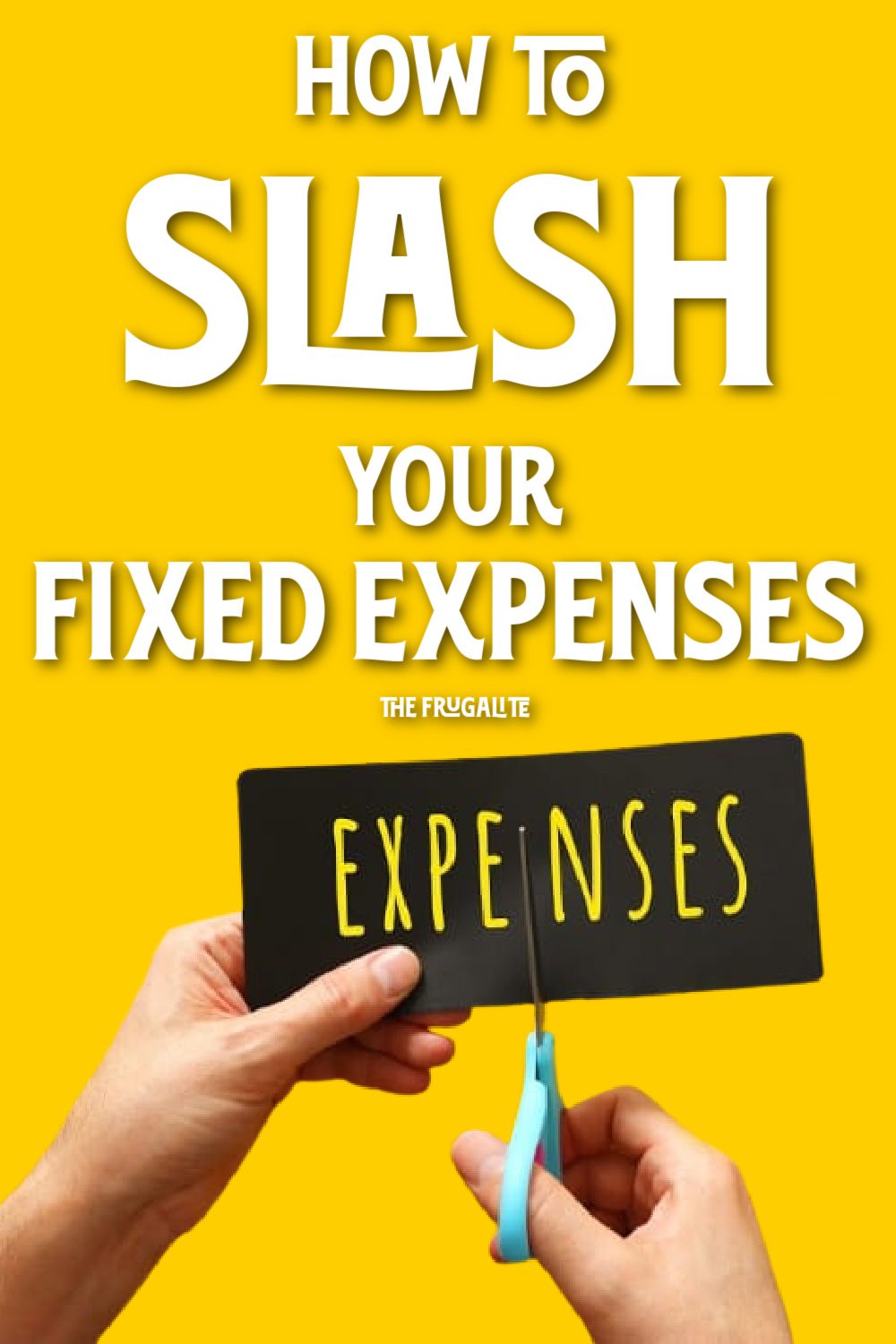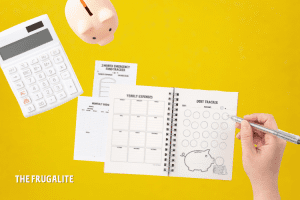(Psst: The FTC wants me to remind you that this website contains affiliate links. That means if you make a purchase from a link you click on, I might receive a small commission. This does not increase the price you’ll pay for that item nor does it decrease the awesomeness of the item. ~ Daisy)
By the author of The Ultimate Guide to Frugal Living and The Flat Broke Cookbook
Lots of financial experts give tips about reducing your discretionary spending but what about those fixed expenses? You can free up some large sums of money by reducing your monthly output.
Most of us have a set of fixed expenses in our budgets. Some of these are vital, some are not, and what is vital for me might not be important for you.
What are fixed expenses?
What fixed payments come out of your bank account every month?
- Mortgage/Rent
- Home Insurance
- Car payment
- Car insurance
- Cable/Satellite/Internet
- Gym membership/Exercise classes
- Loan payments
- Cell phone bill/Home phone bill
- Child support/alimony payments
- Tuition
- Extracurricular activities for the kids
Some of these, you can’t do anything about. However, some of these payments can be reduced or gotten rid of altogether.
The real question is, if your financial circumstances changed dramatically, could you afford your current lifestyle? If the answer to that question is “No” then you need to figure out how to reduce your regular monthly output.
Here are some ideas.
Keep in mind that what works for my family may not work for your family. It will depend whether your spouse is on board, how dire your situation is, and with how much importance you weigh your frugality makeover what you opt to change. Some of these measures would be drastic, and others would only cause a minor change in your lifestyle. Some are expenses you probably should not cut. Let’s take a look at each of these expenses individually and ask some important questions.
- Mortgage/Rent This is often the biggest expenditure that many families make each month. When you buy a house, realtors will nearly always show you homes at the top of your price range. When you are looking for rentals, most people search at the high end of their budgets. That’s fine in good times, but if things go awry, you’re stuck at that same level because banks and landlords don’t care that you lost your job or took a financial hit. Sometimes moving to a less expensive place is your only option if you wish to make big financial changes. This can free up as much as a thousand dollars a month for some families. Moving is expensive, though, and you have to figure that in to the potential savings. If you are only going to save, let’s say, $50 a month by moving, it will be more than a year before you recoup your expenses, and that is going to do little to change your overall outlook. If you are moving to drop your expenses, it needs to be a substantial monthly savings to make it worthwhile. If you own your home, consider refinancing at a better interest rate.
- Home/Car Insurance You have to have insurance so this is not an expense that you can cut out of your budget altogether. However, you can shop around for better prices. You can look into changing your coverage. Do you have duplications in coverage? For example, my insurance company offers roadside assistance for about $40 per year, but my vehicle came with 3 years of free roadside assistance. You can drop your rate further by increasing your deductible, but if you do that, be sure you have access to the deductible amount should an accident occur. If you have several cars in your family, you might not need to have rental car coverage on your policy.
- Car Payment As with a home payment, most people push the envelope and get the nicest vehicle that they can afford. What you drive is a status symbol in North America, and practicality doesn’t always come into the decisions. The best option is to get something that you can afford to pay for in full so that you don’t have a payment. Consider trading in the vehicle you are making payments on for one that you can pay for outright or make payments on for a short period of time. But if you made the decision in less frugal days, you might be what car dealers call “upside down” in your financing. That means that you owe more on your vehicle than it is worth. If that is the case, then you will basically have to pay someone to take it off your hands and that is not always worth your while. If you find yourself in that situation, the best thing you can do is use some of your freed up money to pay off your loan as quickly as possible. At least then, the bank gets less interest from you. If you have more than one vehicle, is it possible to become a one-car family? This will drop your automotive maintenance costs, get rid of an insurance payment, and take away a monthly payment if both vehicles are being financed. If one of your vehicles is paid for, consider getting rid of the one that is being financed.
- Cable/Satellite/Internet This is an area in which cuts can almost always be made. We don’t have cable or satellite, but we do have the best internet available. In our home internet is vital for my job and also for my daughter’s school. Since we have internet, if we have the urge to watch something we can stream it for free online. For your entertainment needs consider something like Netflix. It’s a fraction of the price of a monthly cable or satellite bill and you can choose what you want to watch commercial-free at any point in time, not just when it’s on network television. You have the added bonus of avoiding those pesky commercials too. Expect an outcry if you get rid of these services, but also know that your family will get used to it quickly. Trust me, they’ll live.
- Gym membership/Exercise Classes Being healthy is a top priority if you want to live a frugal lifestyle, but that doesn’t mean you have to spend high monthly fees to do so. You can kill two birds with one stone by coming up with some productive active things to do: chop wood, build, garden or farm. If you live in a place where it’s reasonable to do so, walk instead of driving – you’ll get some exercise and save gas money and wear and tear on your vehicle.
- Loan Payments Look at paying off your debts as quickly as possible using the snowball method. Instead of just making your regular monthly payment, take the smallest debt and pay it off as fast as you can while still making your minimum payment on other debts. Once the smallest payment is paid off, take what you were paying on that and apply it to the next smallest debt, and on and on until you are beautifully debt-free! Then, once you have no debt, commit yourself to staying that way.
- Phone Bills Most people do not need both a home phone and a cell phone. One or the other will nearly always suffice. I actually don’t have either one. I use internet phone service which costs $2.99 per month for the odd telephone call I have to make and email for everything else. It takes some getting used to but you might find that you welcome the peace of people being unable to interrupt you just as you sit down to dinner. You can free up a lot of money each month by getting rid of the phone, but expect people to look at you strangely when they ask for your number and you say, “I don’t have one.”
- Child Support/Alimony Payments There really isn’t a lot you can do about this kind of monthly expense. (And in most cases, they should not be cut.) These numbers are set by the courts and you will go to jail or have assets seized if you don’t make them. As a single mom, I can tell you that there were times when we depended on child support payments to buy our groceries, so the argument can be made that if you have children, it’s your responsibility to make these payments. At the same time, if at the time you made the agreement you earned six figures and now you’re working for $30,000 a year, your former agreement is no longer sustainable and you’ll need to return to court to have the agreement adjusted.
- Tuition If your child is in college or a private school, tuition payments are a fixed expense that you can’t really do much to reduce. You can apply for scholarships, but aside from this, the price is the price. You don’t want your child to start off adult life in debt if you can help it, so if you can find a way to make these payments instead of using student loans, you are giving your son or daughter the biggest possible gift: financial freedom.
- Extracurricular Activities for the Kids This one really depends on your family. If your child is just killing time, then the extracurriculars may not be of high importance. On the other hand, if they are a talented athlete or budding musician, you may find this is a very worthwhile expenditure. Some families who homeschool look to extracurricular activities as a way for their kids to socialize with their peers, and that is also very important. If the activity is not a serious pursuit, sometimes it can be replaced with lower cost activities through the local community center or YMCA. Some children are really over-programmed, with an evening activity every day of the week and two on weekends. Kids need downtime and the freedom to just go outside, climb a tree, and look at the clouds floating by.
Make the changes voluntarily.
It’s far better to make these changes before you’re forced to do so by circumstances. If you can reduce your fixed monthly expenditures, you’re less likely to default on things that are true necessities, like keeping a roof over your head and food in the cupboards. I would prefer to control the cuts myself rather than have the decisions made for me by foreclosures or repossessions. (Believe me, I’ve been there – here’s the story about it.)
Have you made any dramatic changes to your fixed expenses? What advice can you give to people who are just beginning to make these changes? Please share your suggestions in the comments below.
About Daisy
Daisy Luther is a coffee-swigging, adventure-seeking, globe-trotting blogger. She is the founder and publisher of three websites. 1) The Organic Prepper, which is about current events, preparedness, self-reliance, and the pursuit of liberty; 2) The Frugalite, a website with thrifty tips and solutions to help people get a handle on their personal finances without feeling deprived; and 3) PreppersDailyNews.com, an aggregate site where you can find links to all the most important news for those who wish to be prepared. Her work is widely republished across alternative media and she has appeared in many interviews.
Daisy is the best-selling author of 5 traditionally published books, 12 self-published books, and runs a small digital publishing company with PDF guides, printables, and courses at SelfRelianceand Survival.com You can find her on Facebook, Pinterest, Gab, MeWe, Parler, Instagram, and Twitter.












32 thoughts on “How to SLASH Your Fixed Expenses”
College tuition has been raised enormously by US student loans. More money to pay with means higher prices–many TIMES higher in this case. Send your young ones abroad for an education and save a bundle.
I think I am pretty bare-bones compared to this list. House payment, just paid off the truck, phone, landline, internet, I paid off my student loans years ago. No kids and if I did they would pay their own way to college as I did. No children so no child support. Utilities are bare-bones. They won’t even look at me to get solar. The electric bill is to low. Propane for the rest. Water is a have to but scrimp. Entertainment is Purflix, half the price of Netflix and family movies, free YouTube movies, Free Vudu movies. No credit cards. No loans but the house. Cash only. YET I just make ends meet. I rarely eat out. I don’t go to the movies. No nails. No beauty salon. no spa. no gym membership. House payment is less than a 1 bedroom rental. Where else can I cut??
It seems like it would be pretty tough to cut from that budget. The only suggestions I have are these:
Can you reduce things like your food bill?
Can you make more money? It sounds like a side gig might be the thing that gets you back in a better position. I know that nobody wants to work all the time but sometimes we have to take some time to get ahead.
I’m sorry I can’t offer a lot here – you have really done a great job.
The grocery budget is 180 a month. That includes TP, toothpaste, light bulbs and food, etc. I work a 10 – 12 hour day getting paid for 7. Teacher. Have thought about doing teaching online for extra but not sure my body can handle that. The neighbor does that and has to take a day off just to sleep , plus they have others to help with house work and cooking. I need that rest after dealing with school all day. I kinda figure I am ahead. The power, gas and water are paid ahead. I have no other debt but the house. Thanks for the compliment.
I am so impressed by your budget! But, how can you be working 10-12 hours a day and only be paid for 7? As a teacher, your union or state/federal laws should be protecting you. What about teaching part time and finding an “under the table” job? Seniors often need help with laundry, food prep, etc. They are more than willing to pay $20 an hour directly to you, versus the $60 an hour that an agency will charge them. Most of the time they pay you in cash, so what you acknowledge is up to you tax wise. It would help you and help a senior. That being said, you have a very “bare bones budget”!
teachers always have “homework”. they only get paid for the time they are in class. and i think they can elect to have their pay spread out over 12 months instead of just the time school is in.
Stealth Spaniel,
Surely you understand that every teacher works far more than they are paid for? We do it for love, NOT for money!
Having been a teacher, 12 hour days were the norm for me. Some of those hours were at home in the evening, grading papers and making lesson plans. Yes, they give you a planning period — what a joke! Because you may be required to sub for an absent teacher that hour, or do other tasks for the principal. In both education and non-education jobs, I’ve worked hours for which I did not receive pay. They way they do this is to require you to have finish a list of tasks, and if you don’t have them done during your regularly scheduled day, you need to have them done before you report the next day or there goes your job. Happens all the time. Yes, it should be illegal. But in any “employment at will” state, and most of them are, they can fire you for almost anything, including not getting your work done in X amount of hours. So you have to suck it up, buttercup, or run the risk of being fired. And they know it!
M1, please forgive my presumption. Here’s my advice.
0. Your budget is great. You lack time and a partner.
1. Aim for very good work, most of the time teaching, but no more. If you’re in a bad situation, change schools.
2. Find a man or woman who is very good, most of the time. Get married.
Best,
K
Rather than cut further (which really doesn’t seem possible), how can you increase your income? Do you have a skill you can sell? Items you can get rid of – or ones your neighbors are tossing but are still good? Get a second job, even if it’s 12 hours a week at a fast food joint? Increasing your income seems a more realistic solution than cutting to the bone.
Might not be popular but can you use assistance? Here if you qualify to use the food bank, or other help. Anyone can access free/low cost clothing, back to school supplies programs etc Here it is mostly private some requires proff of of income. Pay down debts and look into non consumerism. There are lots of free cycle sites or local but nothing groups. Not advocating taking just to take but if it frees money to better your situation and be out of the situations that money issues lead too it is probably wise.
I am usually on board with your articles and comments however, in this case – Realtors DO NOT automatically show properties at the top of your price range. It isn’t prudent. The loan needs to close and may have difficulty if the Buyer’s are at the top of their budget. Aside from that, why would you want to doom your buyers to being house poor?
I have often guided buyers to less expensive home, let’s start here first, then we creep up in necessary. I also always remind them that while they may qualify for more, they want to be able to continue saving for retirement, going out once in awhile, establishing or maintaining an emergency fund etc.
2nd. Alimony and child support shouldn’t even be on the list – The former spouse and children likely NEED that support or it wouldn’t have been ordered and/or agreed upon. In fact I would go so far as to say to the payor that they should downsize their home, car, extracurricular before even letting the thought cross their mind to ask for a reduction in payments to former spouse and children.
Kay, you sound like a phenomenal agent. I’d definitely want you on my side when buying a house.
I did comment that child support and alimony probably should not be reduced. However…if you are a person who’s income has dropped dramatically, and you used to pay – let’s say $1000 a month – to your ex-spouse for the children, the agreement may need to be revisited. These things are a percentage of your income. It would be awful, definitely, but as a mom who used to get child support, I’d rather my ex legally reduce the amount than to stop paying at all.
Thank you for your insightful comment though – very thought-provoking!
Kay, I wish more agents were like you. When my husband was being transferred from the East Coast to Midwest, we flew out and met with a relator to find a house. I was about 4.5 months pregnant at the time and we had a 2.5 year old, I wanted to stay home with the kids, which meant we had to keep our housing cost as low as possible to make that happen. When we met with the agent, we were very clear that we were looking at a house under a specific amount. She said “oh you qualify for this much higher amount”, let see what we can find. Every house she showed us was close to $50K over what we wanted to pay. Some were higher than our combined income could afford, even if we weren’t planning for our income to be cut more than in half. It was horrible. I was pretty emotional with all the hormones and knowing we were moving a very long distance from our families. We went looking at houses with her for 3 days and at the end of each day, we went back to the hotel and I cried because I didn’t think we could do this.
The morning of the 4th day, we fired that agent and found another one and told her that this was our budget, this is what we wanted in a house and we don’t want to see any houses outside of our set budget. She showed up some more reasonable houses and we realized we could afford the move. We went home and I was not allowed to travel again until the baby was born, we flew out and had to meet with a different agent as part of our relocation package from hubby’s company. She was great. We found a great house the first day and pretty much had things taken care of with the house and a closing date, finding someone to refinish the wood floors, and another person to put flooring in an unfinished basement room before we returned to the east coast to pack and move. We were in our budget and this agent fully understood that our spendable salary was going to be far less with just hubby working. The best thing we did was to dump that first lady who was trying to pressure us into buying something we knew we couldn’t afford.
yeah most will try to shove you into the highest priced home you can afford, whether you want to pay that much or not. all about their end benjamins. that has certainly been my general experience.
I dropped internet and home phone, need a phone to be on call. I use only a dumb phone which costs less than a smart phone. I use internet at work and at my sons business at night with permission of course. free tv only. old car no payment.Cook my own food have a garden and can. Helped my kids pay for their own college, if you have need go to Rubys pantry for anyone not just people with difficulties. all food that would be wasted. JR
There isn’t much room for cutting here. Our old cars are paid. Car insurance is only liability, except on my Packard we added theft insurance. We don’t have a tv or cable. Our cell phone is a pay as you go and we only use it when we are traveling. There is no cell reception on my property. Kids are long gone. We are building our house as we go so no mortgage, but we do have a land payment. We have paying extra on it to pay it off faster. The only place I could cut is buy butchering a few more of my roosters, turkeys and ducks. That would cut my feed bill and fill my freezer. The weather is getting right for butchering. Utilities are on us since we are off grid. I buy a lot of my furniture off of craigslist to cut cost.
I’ve never ever bought a dealer-new vehicle. A thorough mechanic’s exam in advance has been a mandatory precaution for used roadable wheels. The savings have been wonderful. There was a time when I’d even buy wrecked Italian sports cars and make one good roadable car out of the wrecks. Then as the years went by, my needs for load-carrying capacity outgrew my wind-in-the-hair affectation. So I switched to used trucks and haven’t looked back. Then something else happened in the US.
The numbers of the suddenly homeless has been growing and growing in recent years, more in some cities than others. And the ways in which a house can be lost keep growing. Some random examples might include: a house fire after which the insurance inspector discovers you had stored your propane tank(s) inside or too close to your house even while outside, so your claim was denied. Some people have had their house stolen by their city after Code Enforcement fines were run way high out of reach, and the greedy city was all too quick to have a private law firm auction off your house so the city can keep all the proceeds. In California a lender called OneWest illegally backdated thousands of people’s mortgage documents so they could illegally foreclose. And that beat goes on…
Interestingly, a lot of videos have shown up on YouTube about people who have been forced to live as permanent nomads in their vehicles. Just about every kind of wheels gets featured, whether car, SUV, van, truck (with camper shell), travel trailer, or even RV. Those videos often discuss the how-to of such nomad living along with the gear lists that work for them. The point is that if one ever lost fixed base housing, there are plenty of people who have shown how going mobile in a vehicle of your choice is doable. It certainly beats living in a tent city under a bridge.
So would it be wise to look at your next vehicle acquisition as something you could move into on a long term basis if your current living quarters arrangement fell apart?
–Lewis
Dumpster diving and curb picking can help you get some good stuff, especially if you have kids. People are always tossing old toys, especially if they have already had a yard sale. Sometimes you can find good items at apartment complex dumpsters. I’ve gotten most of my furniture that way.
Good point about checking the dumpster areas at apartments, especially toward the end of the month. If you go to an area where college students live, go towards the end of the semester, especially in May. Our son was able to furnish his first apartment with things left by the dumpster. That being said, the exception is upholstered furniture,. A very clean friend of ours got bedbugs from a used sofa.
While we are doing OK during this difficult pandemic times, 4 years ago we had it very rough. I had lost my job and then several months later, I fell in my kitchen and had a very serious injury to my knee. I spent 3 months in the hospital and had 7 surgeries.
For extenuating circumstances, many hospitals will help by reducing or waiving medical bills. One of my surgeons went to the correct person and told them I had lost my job and now this huge medical bills. We had a $8,000 out of pocket for the family and had met about $4K of that prior to my injury. The hospital waived all but $500 of our part of the bill. The total amount was well over $1 million.
At the time, our oldest child was in college. We were able to write a letter of special circumstances explaining about the lost job and high medical bills. We had to provide our taxes and pay stubs showing what our income was and then what it was at the time. My daughter was awarded Pell grant and some state grants to cover her tuition and her part time job covered her room & board. The following year, I was on SS disability and since I had filled out the FAFSA a few days before my injury, we had to do the letter of special circumstances again. This time with 2 kids in college. Both kids got Pell grant plus some state grants.
With this pandemic, it’s my daughter and her husband who are having the financial problems. In May, she lost her job and he had his hours cut from 60 per week down to 35. His pay went down by about 60%. Their bank moved 3 of their car payments to the end of the loan to help out. My husband and I had been talking about changing our cell phone plan and we found Visible, where if you form a “party” with 4 members the cost for unlimited everything is $25 per month (including fees and taxes.) (without a group the cost is $40/month). Her cell phone plan had been $160 per month, so that’s a huge savings for her. Visible has poor customer service, at least in the phase where we are setting up accounts and buying phones. They are owned by Verizon and use the Verizon network. My daughter living in a rural area is limited by companies that offer phone service and Verizon offers the best coverage.
Another thing that has helped them is they were able to find a food pantry to pick up food once a month. It’s just now that things are getting better for them. Daughter started a new job this week and her husband will get increased hours starting Monday. Things are looking up for them but it will take them a few months to recover financially.
Instead of cutting back on income how about ideas to INCREASE income start an online venture that is where commerce and business is at today. Learn technology, build a website with ads, learn something new a language even spanish helps with all the spanish speakers in our country. Earn more from your home as a tutor does not require a college degree plenty of opportunities so don’t go live in a cave.
Excellent article Daisey! To help with college tuition, get a job at a private college that offers free tuition to the employee, their spouse and their children. My son went to Loyola N.O. tuition free for 5 years. To lower auto insurance costs contact an insurance broker who will research different companies for the lowest prices. Recheck every year thereafter. To save money on prescription drugs, even if you have insurance, check out http://www.goodrx.com for tremendous discounts. Hang in there and better days will come along. Blessings and peace.
I clicked here hoping I would find something to help. My husband has been cut to 10 hours a week and that leaves us very short for just our basic bills… he has applied at 100s of places.
We sat down to cut AGAIN and are still over $1000 short just for monthly bills.
I’m taking about electricity, insurance, gas, food…. this doesn’t include putting back money for the therapy our son with special needs has been getting. It’s been helping him tremendously and we want to continue.
We do have 7 kids so our food bill is one of the biggest bills there is.
House is paid for
Cars are paid for
We have the lowest car and home insurance possible
No cable/Netflix or any kind of streaming
We have the ONLY internet we can get in our area- a mobile hotspot so that’s on our phone bill
No gyms
We do now have a credit card amount we are having to pay on… first time in many years. No other loans
We each have one cell phone. It’s a fixed price for my husband and I and then $20 a line for anything after. We have our oldest on that.
No child support
No tuition
We do have a piano teacher that comes to our house for the kids. She is no expensive but I guess we could cut that. It seems fruitless when you look at our budget and see how far we are from making the minimum.
Ideas we have had to cut :
We have land so we are trying to grow food. We haven’t had a lot of success at that yet so it hasn’t impacted our food bill
My husband has tried to get a side gig but everyone wants him 40+ hours a week and that’s making just at or less than he’s making at 10 hours. He helps a lot with our little boy (we have no other kind of help) so it is hard to have him gone 40+ hours. I can do it if it was for enough to help us but when it’s only an extra $200-300 a month it just doesn’t seem worth it. I would rather cut more somewhere.
We have talked about a clothesline to help with electricity…. our electricity bill is $700 or more a month so that’s a big one… I would live ideas to help cut. We have turned the AC way up , make sure lights are off….
We buy our clothes used or get them free from a clothing bank near us.
Any other thoughts are greatly appreciated. We have to figure something out – we can’t keep putting food and electricity on the credit card!
Hi, Bev. It seems like electric is a place you may be able to cut significantly. I’d definitely do the clothesline. I would do an audit and see what in your home is using electric and focus on living without as many of those things as possible. Depending on your climate, AC may be fairly essential but luckily we’re going into a cooler part of the year.
1) Don’t use things that heat up your home, like ovens and dryers
2) Handwash your dishes.
3) Limit shower time if your water heater is electric
4) Hang EVERYTHING to dry – in Europe, very few people even own dryers.
5) Rethink your cooking methods. Items you can prepare quickly use less energy to prepare. So for example, particularly in warm weather, this might be an argument for canned beans over dried beans. Don’t bake in the summer and forget about those recipes with long roasting times.
You can cut a significant amount off your electric.
You may need to also revisit food. When I was in a similar situation 2 meals a day were as close to free as I could make them. Breakfast and lunch were both extremely inexpensive like oatmeal, PB&J, and stuff like that. Never ever anything packaged. Then you’ve got one main meal per day for the bulk of your budget. If your children are picky, you may need to enforce some rules about food waste and you need to figure out at least a couple of inexpensive meals they’ll eat.
A thousand dollars per month is honestly a huge deficit to overcome. You could potentially need to make bigger changes like relocation or renting out some rooms.
I’m sorry I don’t have one outstanding idea that will change everything – I know how hard it is when you get behind like this.
Daisy – Thank you for your thoughts!
Thee is really no way to relocate. We own the land in part with my in-laws and they aren’t going anywhere. We could not sell the land without their agreeing. And honestly we don’t want to give up paid for land. We have no rooms to rent out and we have tried to have people live on the land but haven’t had good experiences and my in laws have said no more.
The AC is essential. We live in a warm, humid, area. I trie DL to kick the AC up to 78 but we need the AC to pull the humidity down or the house gets moist. It stays at 75 now.
Winter will be good – we have a wood burning stove in the main living area. I’ve ajways wanted something to heat the rooms but haven’t figured that out yet.
I think the dryer is probably a big one. With a family of 9 we wash a lot of clothes and with no drying line… I think we run the washer and dryer 2-3 loads Monday – Friday. That’s with everyone having a “day” – mom and dad on Monday, boys on Tuesday, girls Wednesday, towels Thursday and Friday is a day to catch up anything else. I’ll see if we can do th me hanging line soon!
Food – we do have some with food allergies (gluten and dairy) but breakfast is oatmeal most mornings with two mornings of eggs(our own) and veggies. Lunch is gluten free sandwiches most days with baby carrots (chips are rare)
Dinner is usually rice or potatoes with a protein and veggie. We don’t eat packaged food. We make most of our own things – our own spices, sauces, dressings, etc… we have taught the children to not be picky – they eat what they are served thankfully. We have been dipping into some stored food we have so that’s cut the food budget the past few months.
We also make our own cleaning supplies and a lot of our own personal things like soap, toothpaste, and deodorant.
You’re thougts on this… my husband says it’s cheaper to run the dishwasher 2x a day than to hand wash the dishes (with as many dishes as we have we would need to wash a LOT). He’s pretty mathematically inclined (he’s an engineer) and he’s added it up.
We have a in demand hot water heater and one of our “cuts” has been to limit to 2x a week showers and they are limited to 5 minutes.
Our health “insurance” is $800 a month for the family. I’ve often wanted to cut that but when our little boy had his accident the hospital bill was over a million and it was paid no questions asked. Now our son has a brain injury and we can’t really drop the insurance for that reason.
The cooking methods idea is a good one. I haven’t thought of looking at how much I use the oven. We do a lot of Instapot meals but I am going to see how often I use the oven.
Thank you again!
Sorry for typos – typing on the phone with auto correct is always fun ?
Also, some states have help with electricity for people with low incomes or weatherization programs that help with weatherizing your house and help with heating and buying refrigerators. Again, you can contact DCF for information or google your states information. Sometimes you can fill things out online or pick up information at your local DCF.
Also consider things like a sun oven and a Wonder Oven (there are how-to DIYs on the internet). When I do dishes by hand, I do a wash basin and a rinse basin as opposed to running the water for it. This helps cut down on some of the usage. It helps SO MUCH that your kids aren’t picky! Mine aren’t either, for which I am incredibly thankful.
It sounds like you’re doing everything right. Keep on plugging and keep working on what you can produce. You are awesome.
I know this is late in writing. But for insurance there is Healthcare.gov for cheap or free insurance depending on your income. Also, your Brain injured son might qualify for medicaid and also some states have a Brain injury waiver program that covers therapies for Brain injured people and even help in caring for them. You could contact DCF. I think it is Department of Child and Family Services. Also you might qualify for Food Stamps or go to Food pantries. I know that is not ideal. But neither is going into debt 1000 dollars a month on credit card.
Quick note. I didn’t see anyone mention streaming with Roku or other boxes. We need the internet but there are thousands of streaming channels with something for everyone from exercise to music to classic films and TV shows. All free. Also you should look at prepaid cell service. I buy $100 of minutes a year just to keep my phone number. Since I never run out of minutes it means I pay $8.33 a month for phone service. My barely smart phone cost $35 years ago. As others have mentioned you can get a box and pay a small fee monthly to have a “land” line. I figure having the phone with me for emergencies etc. is worth the small extra.
I realize this article is about reducing fixed expenses … but sometimes awful short term surprise expenses also leave a gory trail of continuing fixed expense damage (including credit rating damage) that can last for years. One nasty example is the single scariest fear that many American families have regarding medical costs that could drive them into bankruptcy.
One way to avoid this is to maintain a current US passport so in the event of some kinds of medical calamities, taking advantage of “medical tourism” via any of many other countries around the world can be easily practical. The USA has the highest cost medical system in the world with sometimes the worst (and increasingly politicized) results. It’s very common for Americans within easy distance of Mexico to cross that border for both medical and dental care. I personally know of people who have recovered from Covid in both Mexico and Panama via remedies not allowed by the US government in Amerika but that have saved the lives of millions around the world. Plus a long time neighbor and good buddy who caught Covid in a VA hospital and never made it out alive.
On different topics, I have a long running dispute with Dave Ramsey’s “snowball” method of paying down debt. He believes that one gets the strongest emotional kick by starting by paying off the smallest debts first. In fact … one gets quicker results by paying off first the debts with the highest interest rates. I value better numbers results over Ramsey’s “emotional kick” strategy.
Did you ever wonder how gypsies got their name and where they came from? It turns out that many centuries ago they lived in southern Asia and were forced out. As they migrated westward they lived for several generations in Egypt. When some of them later moved into part of Europe, the Europeans nicknamed them as gypsies as a sloppy way of referring to their history in EGYPt. Today in our era of increasing numbers of people forced into homelessness, I can’t guess at how they might eventually be labeled as they go more and more nomadic.
–Lewis